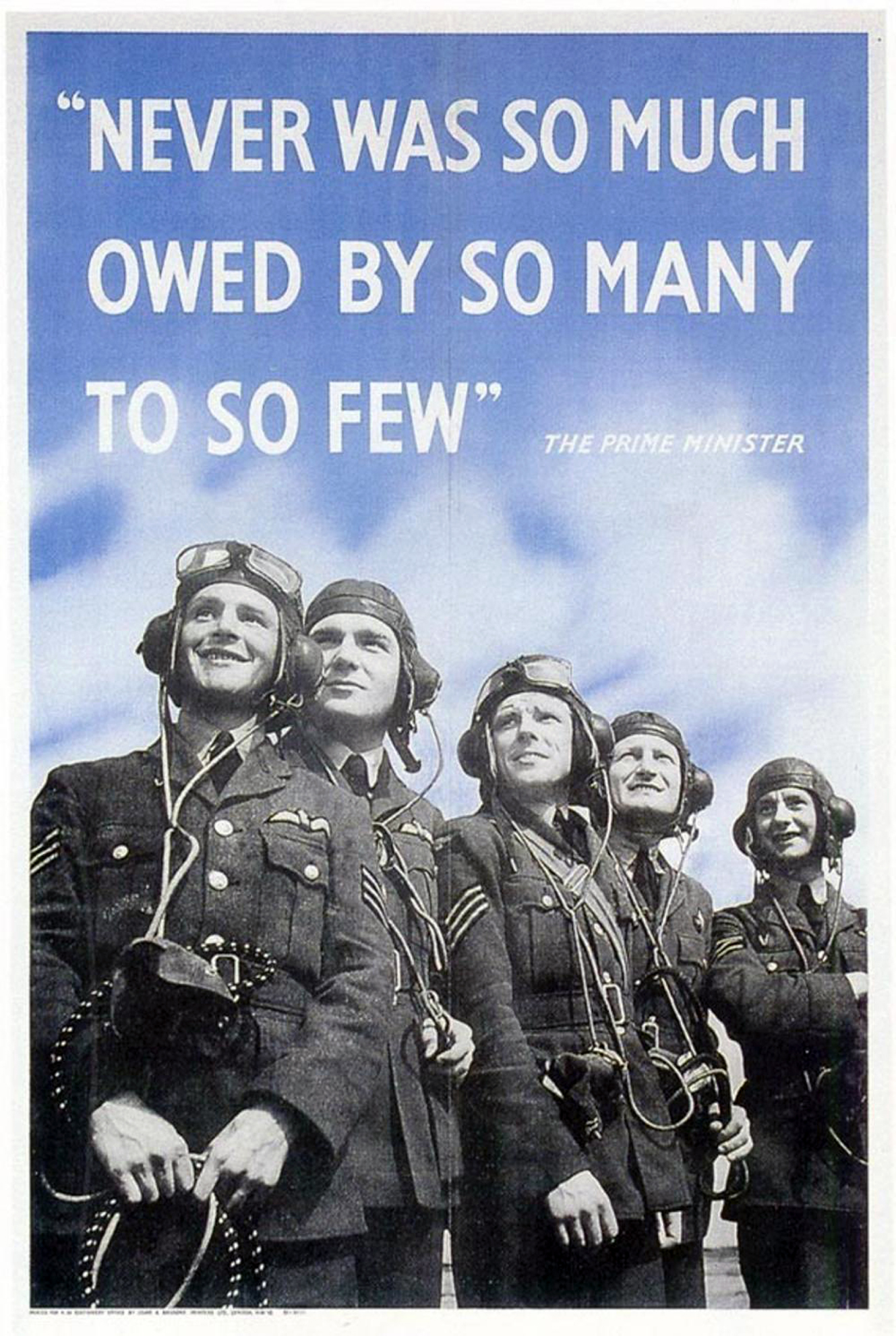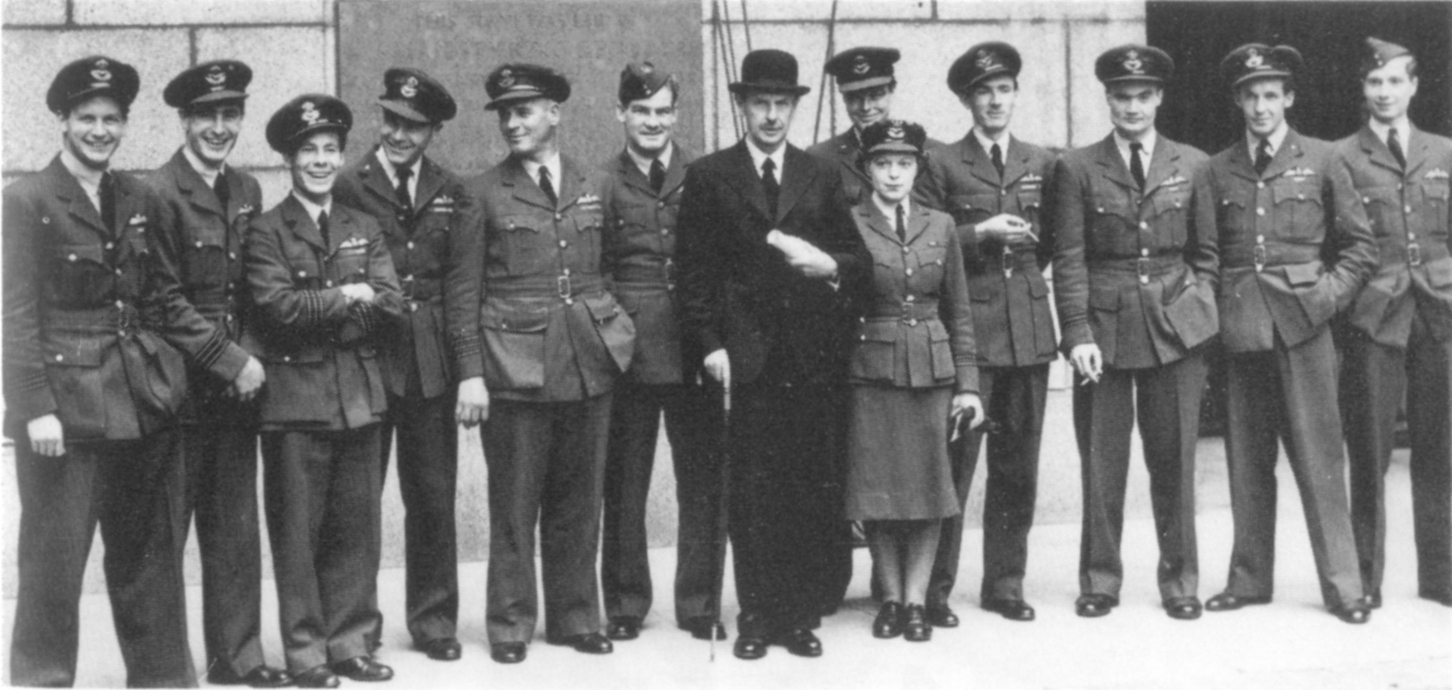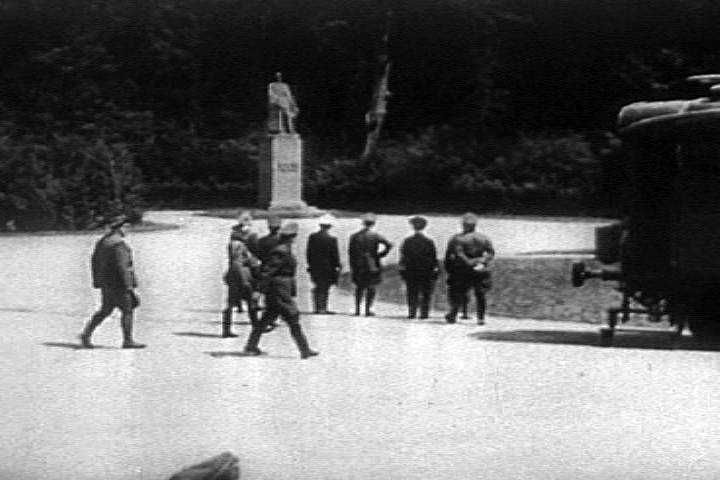|
Never Was So Much Owed By So Many To So Few
"Never was so much owed by so many to so few" was a wartime speech delivered to the House of Commons of the United Kingdom by British prime minister Winston Churchill on 20 August 1940. The name stems from the specific line in the speech, "Never in the field of human conflict was so much owed by so many to so few", referring to the ongoing efforts of the Royal Air Force and other Allied aircrew who were fighting in the Battle of Britain, the pivotal air battle with the German Luftwaffe. The speech came amidst German plans for an invasion. At the end of June 1940, the Luftwaffe had a large numerical superiority over the Royal Air Force, with around 2,550 planes compared to the only 750 planes of the RAF. Pilots who fought in the Battle of Britain have been known as " the Few" ever since, at times being specifically commemorated for Battle of Britain Day, on 15 September. The speech has become one of Churchill's most famous, along with "we shall fight on the beaches", "thei ... [...More Info...] [...Related Items...] OR: [Wikipedia] [Google] [Baidu] |
Never Was So Much Owed By So Many To So Few
"Never was so much owed by so many to so few" was a wartime speech delivered to the House of Commons of the United Kingdom by British prime minister Winston Churchill on 20 August 1940. The name stems from the specific line in the speech, "Never in the field of human conflict was so much owed by so many to so few", referring to the ongoing efforts of the Royal Air Force and other Allied aircrew who were fighting in the Battle of Britain, the pivotal air battle with the German Luftwaffe. The speech came amidst German plans for an invasion. At the end of June 1940, the Luftwaffe had a large numerical superiority over the Royal Air Force, with around 2,550 planes compared to the only 750 planes of the RAF. Pilots who fought in the Battle of Britain have been known as " the Few" ever since, at times being specifically commemorated for Battle of Britain Day, on 15 September. The speech has become one of Churchill's most famous, along with "we shall fight on the beaches", "thei ... [...More Info...] [...Related Items...] OR: [Wikipedia] [Google] [Baidu] |
RAF Uxbridge
RAF Uxbridge was a Royal Air Force (RAF) station in Uxbridge, within the London Borough of Hillingdon, occupying a site that originally belonged to the Hillingdon House estate. The British Government purchased the estate in 1915, three years before the founding of the RAF. Until the outbreak of the Second World War in 1939, the station was open to the public. The station is best known as the headquarters of No. 11 Group RAF, which was responsible for the aerial defence of London and the south-east of England during the Battle of Britain. Hillingdon House served as the group's headquarters. A bunker, subsequently known as the Battle of Britain Bunker, was built nearby to house the Operations Room, which controlled fighter squadrons operating within the group. The Operations Room was also responsible for providing air support during the evacuation of Dunkirk in May 1940 ( Operation Dynamo) and the D-Day landings (Operation Overlord). It was here that Winston Churchill fi ... [...More Info...] [...Related Items...] OR: [Wikipedia] [Google] [Baidu] |
Dominion Of Newfoundland
Newfoundland was a British dominion in eastern North America, today the modern Canadian province of Newfoundland and Labrador. It was established on 26 September 1907, and confirmed by the Balfour Declaration of 1926 and the Statute of Westminster of 1931. It included the island of Newfoundland, and Labrador on the continental mainland. Newfoundland was one of the original dominions within the meaning of the Balfour Declaration and accordingly enjoyed a constitutional status equivalent to the other dominions of the time. In 1934, Newfoundland became the only dominion to give up its self-governing status, which ended 79 years of self-government. The abolition of self-government came about because of a crisis in Newfoundland's public finances in 1932. Newfoundland had accumulated a significant amount of debt by building a railway across the island, which was completed in the 1890s, and by raising its own regiment during World War I. In November 1932, the government warned th ... [...More Info...] [...Related Items...] OR: [Wikipedia] [Google] [Baidu] |
Caribbean
The Caribbean (, ) ( es, El Caribe; french: la Caraïbe; ht, Karayib; nl, De Caraïben) is a region of the Americas that consists of the Caribbean Sea, its islands (some surrounded by the Caribbean Sea and some bordering both the Caribbean Sea and the North Atlantic Ocean) and the surrounding coasts. The region is southeast of the Gulf of Mexico and the North American mainland, east of Central America, and north of South America. Situated largely on the Caribbean Plate, the region has more than 700 islands, islets, reefs and cays (see the list of Caribbean islands). Island arcs delineate the eastern and northern edges of the Caribbean Sea: The Greater Antilles and the Lucayan Archipelago on the north and the Lesser Antilles and the on the south and east (which includes the Leeward Antilles). They form the West Indies with the nearby Lucayan Archipelago ( the Bahamas and Turks and Caicos Islands), which are considered to be part of the Caribbean despite not bor ... [...More Info...] [...Related Items...] OR: [Wikipedia] [Google] [Baidu] |
99-year Lease
A 99-year lease was, under historic common law, the longest possible term of a lease of real property. It is no longer the law in most common law jurisdictions today, yet 99-year leases continue to be common as a matter of business practice and conventional wisdom. The law Under the traditional common law doctrine, the 99-year term was not literal, but merely an arbitrary time span beyond the life expectancy of any possible lessee (user) or lessor (owner). William Blackstone (1723–1780, of Commentaries on the Laws of England fame) states that a lease was formerly limited to 40 years, although much longer leases (for 300 years, or 1000 years) were in use by the time of Edward III. The 40-year limit was based on the unreliable text "The Mirror of Justices" (book 2, chapter 27). In the law of several US states, a 99-year lease will always be the longest possible contract for realty by statute, but many states have enacted shorter terms and some allow infinite terms. Due to the ... [...More Info...] [...Related Items...] OR: [Wikipedia] [Google] [Baidu] |
Destroyers-for-bases Deal
The destroyers-for-bases deal was an agreement between the United States and the United Kingdom on September 2, 1940, according to which 50 , , and US Navy destroyers were transferred to the Royal Navy from the US Navy in exchange for land rights on British possessions. Generally referred to as the "twelve hundred-ton type" (also known as "flush-deck", or "four-pipers" after their four funnels), the destroyers became the British and were named after towns common to both countries. US President Franklin Roosevelt used an executive agreement, which does not require congressional approval. However, he came under heavy attack from antiwar Americans, who pointed out that the agreement violated the Neutrality Acts. Background By late June 1940, France had surrendered to Germany and Italy. The British and their Commonwealth and empire stood alone in warfare against Hitler and Mussolini. The British Chiefs of Staff Committee concluded in May that if France collapsed, "we do not t ... [...More Info...] [...Related Items...] OR: [Wikipedia] [Google] [Baidu] |
Blockade Of Germany (1939–1945)
The Blockade of Germany (1939–1945), also known as the Economic War, involved operations carried out during World War II by the British Empire and by France in order to restrict the supplies of minerals, fuel, metals, food and textiles needed by Nazi Germany – and later by Fascist Italy – in order to sustain their war efforts. The economic war consisted mainly of a naval blockade, which formed part of the wider Battle of the Atlantic, but also included the bombing of economically important targets and the preclusive buying of war materials from neutral countries in order to prevent their sale to the Axis powers. The blockade had four distinct phases: * The first period, from the beginning of European hostilities in September 1939 to the end of the "Phoney War", saw both the Allies and the Axis powers intercepting neutral merchant ships to seize deliveries ''en route'' to their respective enemies. Naval blockade at this time proved less than effective because the Axis co ... [...More Info...] [...Related Items...] OR: [Wikipedia] [Google] [Baidu] |
Armistice Of 22 June 1940
The Armistice of 22 June 1940 was signed at 18:36 near Compiègne, France, by officials of Nazi Germany and the Third French Republic. It did not come into effect until after midnight on 25 June. Signatories for Germany included Wilhelm Keitel, a senior military officer of the Wehrmacht (the German armed forces), while those on the French side held lower ranks including General Charles Huntziger. Following the decisive German victory in the Battle of France (10 May – 21 June 1940) during World War II, this armistice established a German occupation zone in Northern and Western France that encompassed about three fifths of France's European territory, including all English Channel and Atlantic Ocean ports. The remainder of the country was to be left unoccupied, although the new regime which replaced the Third Republic was mutually recognized as the legitimate government of all of Metropolitan France except Alsace-Lorraine. The French were also permitted to retain control of ... [...More Info...] [...Related Items...] OR: [Wikipedia] [Google] [Baidu] |
British Somaliland
British Somaliland, officially the Somaliland Protectorate ( so, Dhulka Maxmiyada Soomaalida ee Biritishka), was a British protectorate in present-day Somaliland. During its existence, the territory was bordered by Italian Somalia, French Somali Coast and Abyssinia (temporarily Italian Ethiopia). From 1940 to 1941, it was occupied by the Italians and was part of Italian East Africa. On 26 June 1960, British Somaliland declared independence as the State of Somaliland. Five days later, on 1 July 1960, the State of Somaliland voluntarily united with the Trust Territory of Somalia (the former Italian Somalia) to form the Somali Republic. The government of Somaliland, a self-declared sovereign state that is internationally recognised as an autonomous region of Somalia, regards itself as the successor state to British Somaliland. History Treaties and establishment In the late 19th century, the United Kingdom signed agreements with the Eidagale, Hamza daud, Habr Yunis ... [...More Info...] [...Related Items...] OR: [Wikipedia] [Google] [Baidu] |
World War I
World War I (28 July 1914 11 November 1918), often abbreviated as WWI, was List of wars and anthropogenic disasters by death toll, one of the deadliest global conflicts in history. Belligerents included much of Europe, the Russian Empire, the United States, and the Ottoman Empire, with fighting occurring throughout Europe, the Middle East, Africa, the Pacific Ocean, Pacific, and parts of Asia. An estimated 9 million soldiers were killed in combat, plus another 23 million wounded, while 5 million civilians died as a result of military action, hunger, and disease. Millions more died in Genocides in history (World War I through World War II), genocides within the Ottoman Empire and in the Spanish flu, 1918 influenza pandemic, which was exacerbated by the movement of combatants during the war. Prior to 1914, the European great powers were divided between the Triple Entente (comprising French Third Republic, France, Russia, and British Empire, Britain) and the Triple A ... [...More Info...] [...Related Items...] OR: [Wikipedia] [Google] [Baidu] |
Adolf Hitler
Adolf Hitler (; 20 April 188930 April 1945) was an Austrian-born German politician who was dictator of Germany from 1933 until his death in 1945. He rose to power as the leader of the Nazi Party, becoming the chancellor in 1933 and then taking the title of in 1934. During his dictatorship, he initiated World War II in Europe by invading Poland on 1 September 1939. He was closely involved in military operations throughout the war and was central to the perpetration of the Holocaust: the genocide of about six million Jews and millions of other victims. Hitler was born in Braunau am Inn in Austria-Hungary and was raised near Linz. He lived in Vienna later in the first decade of the 1900s and moved to Germany in 1913. He was decorated during his service in the German Army in World War I. In 1919, he joined the German Workers' Party (DAP), the precursor of the Nazi Party, and was appointed leader of the Nazi Party in 1921. In 1923, he attempted to seize governme ... [...More Info...] [...Related Items...] OR: [Wikipedia] [Google] [Baidu] |
Anti-aircraft Warfare
Anti-aircraft warfare, counter-air or air defence forces is the battlespace response to aerial warfare, defined by NATO as "all measures designed to nullify or reduce the effectiveness of hostile air action".AAP-6 It includes surface based, subsurface ( submarine launched), and air-based weapon systems, associated sensor systems, command and control arrangements, and passive measures (e.g. barrage balloons). It may be used to protect naval, ground, and air forces in any location. However, for most countries, the main effort has tended to be homeland defence. NATO refers to airborne air defence as counter-air and naval air defence as anti-aircraft warfare. Missile defence is an extension of air defence, as are initiatives to adapt air defence to the task of intercepting any projectile in flight. In some countries, such as Britain and Germany during the Second World War, the Soviet Union, and modern NATO and the United States, ground-based air defence and air defence aircraft ... [...More Info...] [...Related Items...] OR: [Wikipedia] [Google] [Baidu] |







